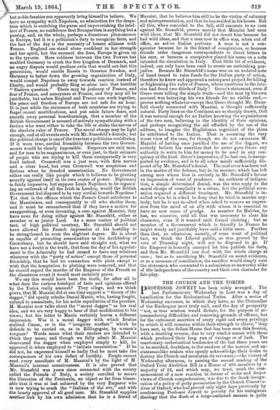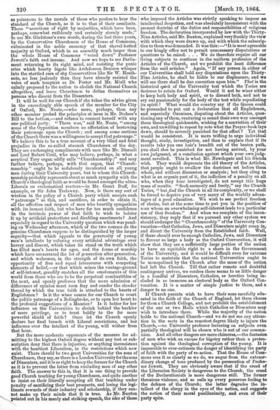THE CHURCH AND THE TORIES.
PROFESSOR JO WETT has been nobly avenged. The last Parliamentary Wednesday in Lent was a day of humiliation for the Ecclesiastical Tories. After a series of Wednesday successes, in which they have, as the Chancellor of the Exchequer most truly said, used the day of prosperity "not, as true wisdom would dictate, for the purpose of ac- commodating difficulties and removing grounds of offence, but for the extremest assertion of every right and every privilege to which it still remains within their strength to cleave," they have met, in the fullest House that has been seen this Session, with a startling reverse, due to very similar causes with those which produced their long run of vantage or of luck. Tho reactionary ecclesiastical tendencies of the last three years are to be ascribed, doubtless, to the candour of the narrow and un- statesmanlike zealots who openly acknowledge their desire to destroy the Church and secularize its revenues ;—the victory of Wednesday afternoon, in passing the second reading of the Oxford Tests Abolition Bill in a House of 400 members by a majority of 22, and which may, we trust, mark the com- mencement of a new reaction in favour of wider and deeper inaugu-
ration of Church comprehension, was due to the frank naugu-
ration of a policy of petty persecution by the Church Conserva- tives of Oxford, who had proved only eight days previously by condemning Professor Jewett to poverty for his ambiguous theology that the flush of a long-continued success is quite as poisonous to the morals of those who profess to bear the standard of the Church, as it is to that of their assailants. Those "assertions of right by majorities,' which have been, perhaps, somewhat ruthlessly and certainly sternly made," to use Mr. Gladstone's own words, during the last three years, by the Conservative Churchmen of the House of Commons, culminated in the noble economy of that shovel-hatted majority at Oxford, which in an assembly much larger than the whole House of Commons "voted down" Professor Jowett's faith and income. And now we hope to see Parlia- ment returning to its right mind, and resisting the panic cries which hearty bigots like Archdeacon Denison whisper into the startled ears of shy Conservatives like Sir W. Heath- cote, no less jealously than they have already resisted the voice of such tempters as Dr. Foster and Mr. Miall who calmly proposed to the nation to abolish the National Church altogether, and leave Churchmen to define themselves as persons who dissent from the Dissenters. It will be well for our Church if she takes the advice given in the exceedingly able speech of the member for the City of Oxford, Mr. Neate,—who more, perhaps, than any other member probed the principles at issue in Mr. Dodson 's Bill to the bottom,—and refuses to connect herself with any one political party. " There was," said Mr. Neate, " among some of the Opposition members an affectation of bestowing their patronage upon the Church ; and among some sections of the Church there was a willingness to accept that patronage." We believe this to be a true account of a very blind and fatal prejudice in the so-called staunch Churchmen of the day. They are exchanging compliments with men like Mr. Disraeli and Lord Robert Cecil, who may believe, perhaps, in what a sceptical Tory organ oddly calls " Churchmanship ;" and may further believe, perhaps, with that organ, that " Church- manship " ought to be sedulously inculcated on all young men during their University years, but to whom this Church- manship probably represents about as much sympathy with the Church's theological faith as would be found amongst the ultra- Liberals on ecclesiastical matters—in Mr. Grant Duff, for example, or Sir John Trelawny. Now, is there any sort of wisdom in the policy of a Church party which accepts such " patronage " as this, and sacrifices, in order to obtain it, all the affection and respect of men who heartily sympathize with its inmost faith, but who have far too much confidence in the intrinsic power of that faith to wish to bolster it up by artificial protections and disabling enactments ? And especially in regard to the University question which was pend- ing on Wednesday afternoon, which of the two courses do the genuine Churchmen suppose to be distinguished by the larger sagacity—that which appeals to the generosity of young men's intellects by refusing every artificial advantage over heresy and dissent, which takes its stand on the truth which has filled men's hearts for ages, and the forms of worship which have consecrated the lot of generation after generation, and which welcomes, in the strength of its own faith, the opportunity of free and equal intercourse with competing elements of belief,—or that which seizes the vantage-ground of self-interest, greedily snatches all the emoluments of this world from those who are to be the perpetual combustibles of the next, and openly professes that the mere admission of differences of opinion must soon fray and sunder the slender thread by which the true faith is attached to the hearts of Englishmen ? Is it the wiser course for our Church to court the politic patronage of a Bolingbroke, or to open her heart to the profound suggestions of a Maurice? Is it better for her influence on the Universities to shrink behind the buckler of mere privilege, or to trust boldly to the far more powerful shield of faith? Once let the Church openly declare her final breach with Liberal convictions, and her influence over the intellect of the young, will wither from that hour.
But the more moderate opponents of the measure for ad- mitting to the highest Oxford degree without any test or sub- scription deny that there is injustice, or anything inconsistent with the heartiest Liberalism, in the restrictions which now exist. There should be two great Universities for the sons of Churchmen, they say, as there is a London Universityfor thesons of Dissenters, and it is as right to keep the former for the Church as it is to prevent the latter from excluding men of any other faith. The answer to this is, that it is one thing to provide good Church teaching for young Churchmen, and quite another to insist on their literally accepting all that teaching under penalty of sacrificing their best prospects, and losing the legi- timate rewards of their industry and scholarship, if they can- not make up their minds that it is true. As Mr. Buxton inted out in his manly and striking speech, the idea of those who imposed the Articles was strictly speaking to impose an intellectual despotism, and was absolutely inconsistent with the present doctrine of the duties and responsibilities of religious freedom. The declaration incorporated by law with the Thirty- Nine Articles, said Mr. Buxton, explained very frankly the view with which they were drawn up, and with which the subscrip- tion to them wasdemanded. It was this:—"It is most agreeable to our kingly office not to permit unnecessary disputations or questions to be raised. . . . We do therefore require all our living subjects to continue in the uniform profession of the Articles of the Church, and we prohibit the least difference from the said articles." Again, " If any person in either of our Universities shall hold any disputations upon the Thirty- Nine Articles, he shall be liable to our displeasure, and we will see there shall be due execution upon him." That is the historical spirit of the University test which the Tories are desirous to retain for Oxford. Would it not be wiser either to keep both body and spirit, or to discard both, and not to cry out passionately for the body of the test while repudiating- its spirit ? What would the country say if the Queen could be persuaded to put out a declaration that all Englishmen, and especially Oxonians, disputing about the Articles, ques- tioning any of them, venturing to sound their own way amongst these theological quicksands, wishing for a conviction of their own, and unwilling to repeat by rote what the Prayer-book lays. down, should be severely punished for that effort ? Yet that would be consistent. It is mere trifling to urge individual thought, study, investigation, and then to explain that if its results take you one hair's breadth out of the beaten path, you shall then be punished for not having arrived, by your own judgment, at a conclusion against which your own judg- ment revolted. This is what Mr. Newdegate and his friends- wish. They would deprecate the old theory of the Articles, that people ought to swallow the doctrines set before them: whole, and without discussion or analysis ; but they cling to what is an organic part of it, the infliction of a penalty on all who, when they have investigated, do not accept this huge mass of results. " Seek earnestly and freely," say the Church. Tories, " but find the Church in all its complexity, or we shall be forced to deprive you of very many of the worldly advan- tages of a good education. We wish to see perfect freedom of choice, but at the same time to put you in the position of men whom an overwhelming self-interest leads to a particular use of that freedom." And when we complain of the incon- sistency, they reply that if we pursued any other system we should endanger the " Churchmanship " of the University Con- vocation—that Catholics, Jews, and Dissenters might creep in, and divert the University from the Establis)ied faith. Well, if there should ever be enough Catholics, Jews, and Dissenters. to flavour so large a body as the Oxford Convocation, it will show that they are a sufficiently large portion of the nation to have an equitable right to a share in the Government- of the University, and it would be difficult even for extreme- Tories to maintain that the national Universities ought to be monopolized by the Church after the mass of the nation had left the Church. Till that rather remote and doubtful contingency arrives, we confess there seems to us little danger in a handful of Dissenters, Catholics, or heretics being in- cluded in so immense an electoral body as the Oxford Con- vocation. It is a matter of simple justice to them, and a. danger to no one.
If Church parents wish to have their sons carefully edu- cated in the faith of the Church of England, let them choose for them a Church College, and not prohibit the establishment of the one or two Halls which Catholics or Dissenters may wish to introduce there. While the majority of the nation holds to the national Church—and we do not see any attrac- tion in the sects in the remotest degree likely to injure the Church, —no University professor lecturing on subjects even partially theological will be chosen who is not of our commu- nion. And all other dangers are mere chimeras,—the fantasies- of men who wish an excuse for bigotry rather than a protec- tion against the theological corruption of the young. It is impossible to over-estimate the danger of identifying the party of faith with the party of re-action. That the House of Com- mons sees it as clearly as we do, we augur from the extraor- dinary change of tone produced by the persecution of Profes- sor Jowett. They are obviously aware that if the creed of the Liberation Society is dangerous to the Church, the creed of the Declarationists is more dangerous still. The former threatens violence, and so calls up every generous feeling to the defence of the Church; the latter degrades the in- tellect of the clergy in the eyes of the nation, and suggests the notion of their moral pusillanimity, and even of their party spite.



































 Previous page
Previous page